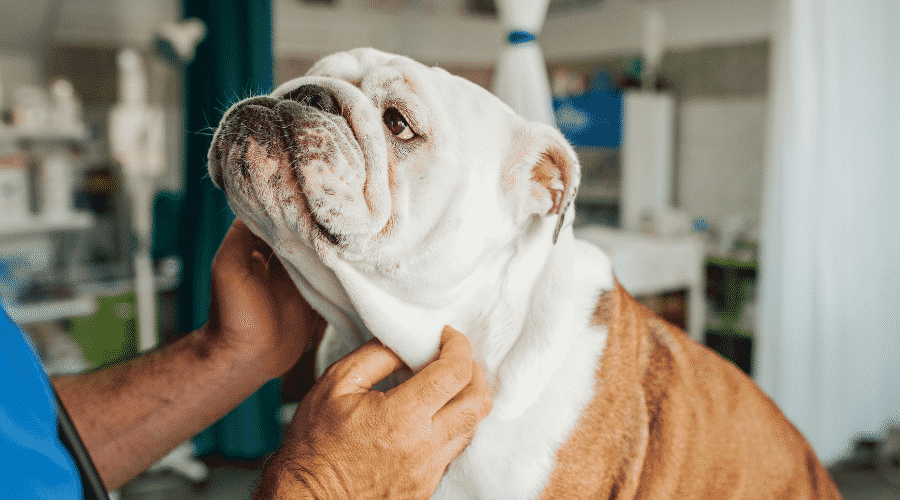English Bulldogs are the iconic sour mug doggos and one of the most distinctive breeds in the world. They have always been popular in America and consistently rank in the top 10 dog breeds. Many families often wonder how long they can live and how they can keep them around for longer. English Bulldogs have an average lifespan of 8 to 10 years. However, every dog is unique. Some can live longer than this, and sadly, some don’t reach this age.
English Bulldogs are friendly, docile, courageous, and tons of fun. There are many reasons to welcome one of these comical canines into your life. Unfortunately, they don’t have the best health compared to many other breeds, putting many prospective owners off. However, there are many ways to keep them as healthy as possible and hopefully live longer.
When it comes to health and lifespan, many things are out of your control, such as accidents occurring and the genetics they inherit. But we run through the factors that can help to boost their health, such as working with responsible breeders and feeding them high-quality nutrition. Let’s look closer at the world of Fido fitness and give your English Bulldog the best chance to be healthy.
English Bulldog Breed

The English Bulldog is an adorably chunky little canine. They only measure between 14 and 15 inches tall, but they weigh between 40 to 50 pounds. They have a square, low-set frame and are smothered in skin rolls. Under all of that skin is a powerful pup with incredible strength. Their strength is why English Bulldogs were used to create the dozens of Bulldog-terrier types that we know and love today, such as the Staffordshire Bull Terrier and the American Pitbull Terrier.
Although these dogs love to laze, they need regular exercise to keep them fit, healthy, and mentally stimulated. Otherwise, they become bored, destructive, and downright lazy. Their most distinctive feature is their flat, wrinkly face. When relaxing, they have a scowl, but their face lights up with an ear-to-ear grin when they smile. Their flat face is one of the reasons why their health isn’t the best, and we will discuss this in more detail later.
How Long Do English Bulldogs Live?
English Bulldogs have an average lifespan of 8 to 10 years. It isn’t the longest lifespan compared to other dog breeds, which can live up to 18 years. But it also isn’t the shortest, with some dog’s lifespans only expected to be 5 to 7 years, such as the Dogue de Bordeaux. All English Bulldogs are different, and some might live beyond 10 years, whereas others don’t reach the expected 8 years. There aren’t any official records about the longest-living English Bulldog, but research online shows very few Bulldogs living past their 12th birthday.
Health Factors That Impact English Bulldog Lifespan

Not all English Bulldogs experience the same health problems. Some might encounter all of them, others none, and some experience different health problems altogether. All English Bulldog owners should know the primary health conditions and their symptoms. This way, you can spot the signs early. Regular vet checkups and early detection are the best way to combat any health issue.
Brachycephalic Obstructive Airway Syndrome

English Bulldogs have a flat facial structure, which means they fall into the brachycephalic category. Brachycephalic obstructive airway syndrome (BOAS) causes a narrow upper airway structure, making breathing difficult, especially during hotter weather. Heatstroke is a real risk, too. Owners must take extra care because their oxygen requirements might not be met, which can cause fainting, seizures, and sudden death. It is a chronic and debilitating disease that affects the quality of life for these dogs. Often, surgical correction of the airways is the only option to improve their quality of life.
Knowing about this condition and how to react to the symptoms is incredibly important. It also adversely affects their gastrointestinal tract, sleep, blood pressure, liver, etc. The pressure and combination of these secondary health problems can shorten a dog’s lifespan. Working with a responsible breeder who only breeds the healthiest Bulldogs is essential. Any dog suffering severely from BOAS should not be reproduced.
Eye Conditions
Bulldogs are prone to several eye conditions, too. The most common eye problems include cherry eye, inverted eyelids, dry eye, and cataracts. Cherry eye is the most common, diagnosed when the third eyelid gland (in the lower eyelid) prolapses. It can be painful and lead to secondary eye problems. Also, due to their flat faces and large, protruding eyes, Bulldogs are more at risk of general eye injuries. Although eye conditions do not directly shorten lifespan, the pain, the associated stress, and the increased risk of injury from poor vision can adversely affect their health and safety.
Heart Problems
English Bulldogs are prone to multiple types of heart disease, including pulmonic stenosis, atrial septal defect, subaortic stenosis, and mitral valve dysplasia. These conditions have their own problems and symptoms, but the most common are difficulty breathing, coughing, fatigue, and fainting. Each condition can lead to congestive heart failure and premature death. Visiting the vet regularly is essential because they can monitor your pup’s heart and listen for irregularities you might not notice. Bulldogs with cardiac conditions are likely to have a shorter lifespan than those without.
Patellar Luxation
Patellar luxation is a common orthopedic problem in smaller dog breeds. However, the Bulldog is prone to it too. It can occur as a result of trauma, although genetics play a substantial part. The knee joint forms abnormally and causes it to slip out of the joint. Symptoms of this condition include a skipping gait, limb lameness, and kicking out. Vets can slip it back into place, however, severe or persistent cases often require corrective surgery. Although patellar luxation doesn’t lower lifespan, it can reduce a dog’s quality of life and increase stress.
Skin Infections
English Bulldogs are prone to various skin conditions. Their skin folds are a breeding ground for bacteria and yeast due to the trapped moisture, which can lead to sores and infection. Skin fold pyoderma, skin fold dermatitis, Demodex mite infection, folliculitis, and muzzle acne are some conditions to watch out for. Keeping your Bulldog’s skin folds clean and dry is the best way to prevent skin problems and infections. Use doggy skin fold wipes to clean them several times a week to keep them clean.
If you notice any redness, soreness, hair loss, oozing, an unpleasant odor, or severe itching or licking, take your pup to your vet for an evaluation. Skin infections don’t directly affect their lifespan, but they can make them uncomfortable, increase stress, and lead to secondary health problems if left untreated.
Other Factors That Impact English Bulldog Lifespan

Care & Lifestyle
When dogs’ needs are met, they are more comfortable, which reduces stress. Stress can significantly affect lifespan, and it’s more important than people realize. Bulldogs need daily exercise to keep them fit, mental stimulation to keep them busy, and lots of love and cuddles with their favorite humans. Leading an active lifestyle is vital for the sometimes lazy Bulldog and their overall wellness.
Genetics
The genes your Bulldog inherits from their parents are among the most influential factors in their health and lifespan. Unfortunately, it’s not something you can control. The only aspect you can control is the breeder you work with and one that only breeds healthy dogs and screens for health problems.
For this reason, working with a responsible and ethical breeder who does everything they can to produce healthy litters is essential. You need to research every breeder you consider, and a great place to start your search is on the AKC’s English Bulldog breeder page.
Make sure you meet the pups and parents and ask for the health certificates. Responsible breeders usually charge more for their pups, but it’s worth spending a little more on a healthy pup. Irresponsible breeders pump out as many puppies as possible, using sick dogs and providing little to no health care. This is likely to cost you much more in the long run, and you end up with an ill pup who is expected to live a shorter life.
Health & Vaccinations
Staying up to date with regular health checks and vaccinations at the right time is crucial for your Bulldog’s health. Vets can check for health problems that you might overlook, such as with their heart. And keeping on top of their vaccination schedule is a simple way to fight disease and infection. Pet health care can be expensive, but ensuring your dog’s health is imperative. Consider pet insurance as it can help offset costs and ease the financial burden of expensive health care costs.
Nutrition

Choosing a high-quality diet for your Bulldog is essential, too. Not only does it need to meet the Association of American Feed Control Officials (AAFCO) guidelines as a basic requirement, but it also needs to meet their individual needs. If your pup has food allergies or a sensitive digestive system, you must find a diet that suits him. Often, cheap doggy food doesn’t offer the nutrition they need to thrive. Age-specific nutrition is also vital to help your Bulldog develop healthily.
If you’re unsure, your vet can advise you with individual nutritional advice. You must monitor the treats you give your doggo throughout the day and never feed him too much. Obesity can take years off their lifespan and heighten the risk of other life-limiting health problems. It’s also imperative to keep dangerous foods out of paw’s reach. Your Bulldog will sniff out and eat everything they can get their chops around.
Spay & Neuter
If you have no plans to breed your English Bulldog, neutering or spaying is wise. The University of Georgia found that spaying and neutering can improve life expectancy by 14% to 26%. They also found that not spaying or neutering your pooch can shorten their lifespan by around two years. These procedures aren’t just about birth control. They can also improve their overall health status and reduce cancer rates.
How To Help Your English Bulldog Live A Long Life

- Work With A Responsible Breeder. Finding a reputable and ethical breeder is the first and most crucial step to finding a healthy English Bulldog. Responsible breeders have higher puppy prices, but this can significantly reduce your English Bulldog’s long-term costs. Avoid irresponsible breeders and puppy mills at all costs.
- Visit Your Vet Regularly. Regular visits to the vet and staying on top of their vaccination schedule are simple ways to keep diseases, infections, and other problems at bay. Your vet can detect health problems early, often increasing the chance of recovery and lifespan.
- Neuter Or Spay At The Right Time. It’s essential to perform these procedures at the right time. Speak to your vet early on to find the best time for your English Bulldog. These procedures can extend your dog’s lifespan.
- Leading An Active Lifestyle Is Crucial. English Bulldogs can be very lazy pups if left to their own devices. But getting them moving is really important to improve their cardiac system and overall wellness.
- Mental Stimulation Is Essential. Bulldogs have a lot of mental energy that needs an outlet. They enjoy playing with their family and solo playtime. Invest in tough doggy toys that they can chew for hours on end. Otherwise, they might destroy your home.
- Provide A High-Quality Diet. Picking high-quality food ensures their nutritional needs are met and their tastebuds satisfied. Healthy fats are essential, and cheap quality foods rarely contain these. Monitor their weight regularly to ensure they are in fit condition.
- Dental Health Is Key. Many owners do not know that dental hygiene can extend a dog’s lifespan and affect their overall health. Brush their teeth weekly from an early age so they get used to it.
- Be Safety Conscious. Keeping your Bulldog safe from dangerous objects and situations is essential. Sure, you cannot control everything, but control what you can. Home security and being aware of their surroundings in public are crucial to their health and to avoid their lifespan being cut short.
- Provide Proper Training. English Bulldogs can be incredibly stubborn, and training is important. Training increases their confidence and happiness levels, which reduces stress-related health problems.
- Raise Them With Love And Affection. Providing them with a happy and loving home with plenty of human interaction is the key to their happiness. And a happy dog is a healthy one.
Frequently Asked Questions
We know our readers still have many questions about Bulldogs and how long they live. If you don’t see yours below, ask about it in the comments, and we’ll find the answer.
How Long Do English Bulldogs Live?
The average lifespan of an English Bulldog is eight to ten years. How long their lifespan is depends on various factors such as consuming a healthy diet, leading an active lifestyle, living in a happy and safe environment, etc. Working with a responsible breeder gives you a Bulldog who is likely to live longer, rather than one from a puppy mill.
Can English Bulldogs Live Longer Than 10 Years?
English Bulldogs can live longer than ten years, but unfortunately, they are the minority. However, keeping them healthy with these tips might mean they live beyond ten years.
Is There A Difference In Lifespan Between Male And Female English Bulldogs?
There isn’t any conclusive evidence to suggest one gender lives longer than the other. Some studies show females live longer and vice versa. The most influential factors on lifespan are genetics and lifestyle.
What Is The Life Expectancy Of English Bulldog Mixes?
The lifespan of an English Bulldog mix depends on the other breed they are mixed with. English Bulldogs have a relatively shorter lifespan than other breeds, so the other breed will likely increase their health and expected lifespan. Every dog is different, and an average lifespan is only an estimate.
Learn More About English Bulldogs
English Bulldogs are seriously cute and charming, and they add lots of humor and love to their family. But sadly, Bulldogs have many health issues, and it’s important to keep them healthy to live a long life. Many factors go into keeping them happy and healthy. The most important first step is to work with a reputable breeder who breeds healthy Bulldogs and screens for their common health problems.
Once you have your Bulldog, you must keep them active and mentally stimulated. Games like “hide and seek” and “go find it” are super fun games to try with your pup. Feeding them a high-quality and healthy diet is key to keeping them healthy, too. Think about feeding healthy snacks instead of doggy treats. Invest in pet insurance for your Bulldog to help manage potentially expensive health costs. If you suspect any health problems, it’s crucial to take them to your vet and get them investigated immediately.
Why Trust Love Your Dog?
Emma is a dog owner with over 20 years of experience. She has also worked as a professional dog walker and sitter for many years, taking care of countless dog breeds with different needs, including English Bulldogs. Emma dedicates countless hours researching the latest pet care, health, food, and training developments to keep her two best buddies and other doggy clients as happy and healthy as possible. She works alongside a professional and experienced team to bring the best, most accurate, and up-to-date information to our readers.




